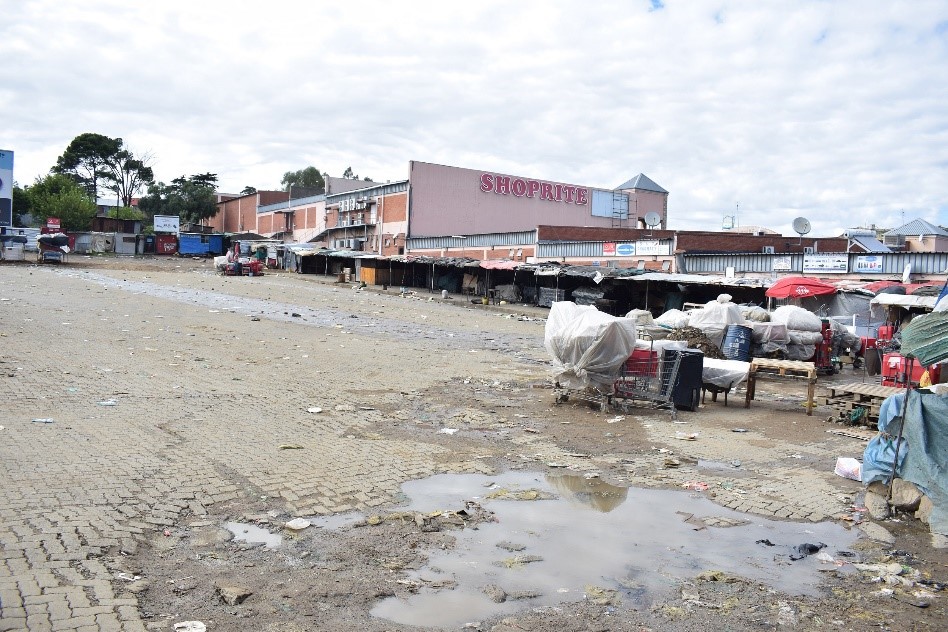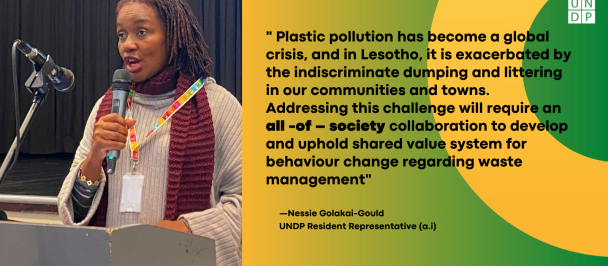Image of Maseru bus-stop during the lockdown
Even though Lesotho was the last country in Africa to record a confirmed case of COVID-19, the country put in place all the preventative measures outlined by the World Health Organization (WHO) including social distancing to slow the spread of the coronavirus (Covid-19). It is recommended that people avoid crowded places and gatherings to reduce exposure and spread of the virus. In line with this, Lesotho implemented the national lockdown from 30 March 2020 to …….. During the lockdown, it was almost eerie going through the streets of Maseru; with almost no trace of any human activity. For the first time ever, I was able to make the little corners of the main busstop area and cover the short distance into the CBD in a few minutes. Maseru district hosts almost a quarter of the two million population of Lesotho, and is a major economic hub for the country, providing essential sources of livelihood and employment for almost 326, 688 labour force.
Impact of lockdown on the economy of Lesotho
COVID-19 is expected to have a negative impact on the already weak economy of Lesotho, which according to the Central Bank of Lesotho is expected to decline by 3.1 points. It is also expected that Lesotho is going to experience a further decline in the Southern African Customs Union (SACU) revenue, which makes the bulk of the country’s revenue. Due to the COVID-19 pandemic, it is estimated that the SACU member states will lose an estimated 7 billion Rand in a month in customs revenue. Domestic tax collection is also expected to suffer a major blow, due to lockdown that slowed economic activity and businesses. To make matters worse, it is not known how long the COVID-19 pandemic will last. This is creating a new norm where we need to live with the disease and this, if not addressed, could suggest a longer and worse economic impact on developing countries like Lesotho.
Because of the national lockdown, most sectors that contribute to the GDP of the country are going to suffer. It is already forecasted that the mining, construction and textiles sectors will decline by 13.4%, 10.2% and 14% respectively. Construction and mining companies have already indicated that they are going to limit operation and retrench some of their workers; while the entertainment and tourism sectors will be in limbo for a long while. Another sector that is set to face economic challenges is the Small and Medium Enterprises (SMMEs) which is predominately composed of informal traders. SMMEs and informal traders make 80% of the domestic private sector and contribute 9.1% to GDP. Informal traders like many others were not able to operate during the national lockdown. This negatively affected their livelihoods as most of them survive and feed their households through the incomes generated on day by day selling on the streets of Lesotho. Another challenge with the restricted movement was the inability to replenish stocks from South Africa, as borders were closed for small scale deliveries and Lesotho depends largely on South Africa for most of its basic supplies and essential goods . Post-lockdown, these traders are going to face dwindling stock levels due to supply chain disruptions and potential lower sales resulting from potential consumer apathy and discrimination based on the perceptions associated with COVID-19 and it how it is transmitted. These developments are expected to have a significant negative impact on employment and widen the existing inequalities between the rich and poor, urban and rural population, and a resulting disparity in access to various social services. Ultimately, it is expected that the crisis is going to increase the number of unemployed and food insecure people.
Further, despite easing conditions for lockdown, most industries in Lesotho and South Africa will be operating at sub-optimal levels to comply with the requirements for social distancing. This is going to affect households’ incomes, resulting in increased vulnerabilities and pushing more people into the poverty bracket.
It is not all gloom: could COVID-19 bring about the new normal
The formal sectors and informal sector experienced unprecedented disruption as stores closed; people stayed home, and global supply chains were, disrupted, disconnected or overwhelmed. While many people focused on meeting present challenges, the importance and consideration to the recovery phase of the COVID-19 were initially not taken into consideration as countries were rippling with the effects of COVID-19. Countries are now pondering what “the new norm” may look like for the rich and the poor economies, households, businesses, public and social services delivery.. The emerging questions that countries are battling with are the short-term and long-term effects of COVID-19 on their economies and livelihoods of their citizens.
Some of the current restrictions imposed to control the spread of COVID-19 are likely to remain in place beyond the lockdown for both developing and developed nations. The social distancing, most likely will stay, and this is expected to affect performance of many economic sectors. For instance, Lesotho has identified tourism as one of the key economic sectors for stimulating domestic economic growth and employment creation. However, with the social distancing, the sector is bound to suffer a major set-back due to travel restrictions within and between countries and changes in consumer behavior. On the other side, this could also be an opportunity to promote domestic tourism and grow the local tourism offer to take advantage of restrictions for international travel. This will however require innovative solutions to encourage tourism within the Mountain Kingdom.
During the lockdown period we have experienced changes in the way that businesses operate. Beyond the limited trading and operating hours, general hygiene practices were introduced for all operating businesses and essential service providers. Businesses and companies controlled the number of people that could enter the stores and ensured that social distancing remains observed. In addition to social distancing, sanitizers will be a new norm for operating business and maintaining client assurances on hygiene. The post COVID-19 could also impact the way in which businesses serve their clients, by diversifying service offer and pushing technology adaptation. The McKinsey hypothesizes that the COVID-19 will accelerate digital strategies and demand business agility to ensure survival while managing the rising humanitarian crises. In South Africa, certain chain stores encourage customers to purchase and pay for their groceries on-line and collect directly outside the stores to enforce social distancing and decongest shopping centres. This will definitely be part of the new norm, that may also contribute to increased uptake of local delivery services, as consumers get accustomed to ‘staying home’ and minimizing unnecessary clogging of locations.
During the lockdown, local small business and informal traders opted to use social media to sell their products as they were not allowed to operate. Due to the limited trading hours for operating shops and reduced movement of people, the digital channels provided an opportunity to move stocks and create a new customer base. For most of the smaller retailers and customers alike, it was the first time using these platforms, especially for the older generation. Post-COVID-19, it is expected that many shoppers will remain with producers and retailers that met their needs during the lockdown period, establishing digital platforms as an alternative shopping experience to the traditional shopping centres and malls. These new relationships built at a critical time of need will influence long-term loyalty and affinity. This also posits opportunities for new business ventures for enterprising youth. Lesotho Accelerator Lab is working with local application developers to create a virtual marketplace to connect local producers/ suppliers to local market.
Lesotho imports 85% of its consumer goods and services from South Africa. Restriction of movements in both countries resulted in a large disruption of local supply chains, and created panic buying among consumers. The lockdown also increased food insecurity among different households with holding of food stuff as prices of basic consumer goods increased. This was seen by the large number of food parcels that have been donated by private companies and individuals. A major lesson from the COVID-19 has been the need to create sustainable local supply for food at national and household level as local demand soared during this time. Besides providing food packages to affected families, people are also finding solutions for promoting long-term household food security and production practices; even those with small household gardens invested more time in growing food crops for their households. The emerging food supply shortages may shift production capacities and standards in the country and open markets for local agricultural produce.
To become part of the solution, the Lesotho Accelerator Lab is exploring local solutions and innovations addressing the immediate challenges of COVID-19 and creating lessons that may be useful in curating Lesotho’s own “new norm” post-COVID-19. Among the local solutions being explored, the Lesotho Accelerator is working with youth developer to create an e-commerce platform to assist those that were hard hit by the lockdown and not able to sell their produce/products. Moreover, we are also assisting the Ministry of Health to develop an application that will be used by Village Health Workers and the general public to diagnose suspects of COVID-19 whenever symptoms of the virus are recognized. In partnership with WHO, Ministry of Health, the lab has developed floor stickers which people will stand on when queuing for services in public places to enforce social distancing. In the bus and taxi rank the lab has developed hands-free wash stations which will assist in hand hygiene.

 Locations
Locations


